First gen farmers start organic veg business for local supply
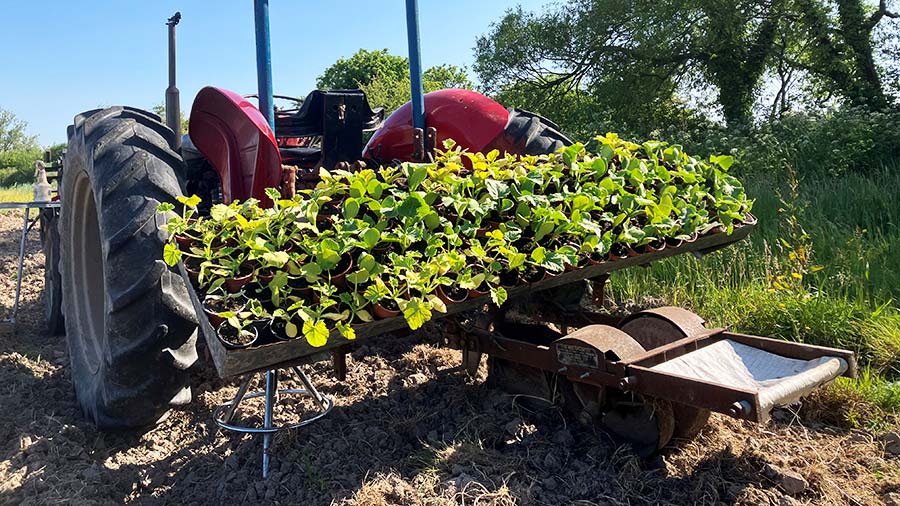 © MAG/Emma Gillbard
© MAG/Emma Gillbard First generation veg farmers Jono Hughes and Holly Tomlinson took the plunge to set up an organic veg business, with the aim of supplying locally produced vegetables in South Wales and encourage young people into the industry.
Keen to base the business known as “Blas Gwent” on the doorstep of a large market potential, the husband and wife team purchased a 4ha field a few miles east of Cardiff in February last year.
Their first harvest saw them produce an array of crops including courgettes, peas, squash, broccoli, cabbage, cauliflower, lettuce and beetroot.
See also: Five-year farm trial aims to find ultimate soil rejuvenator
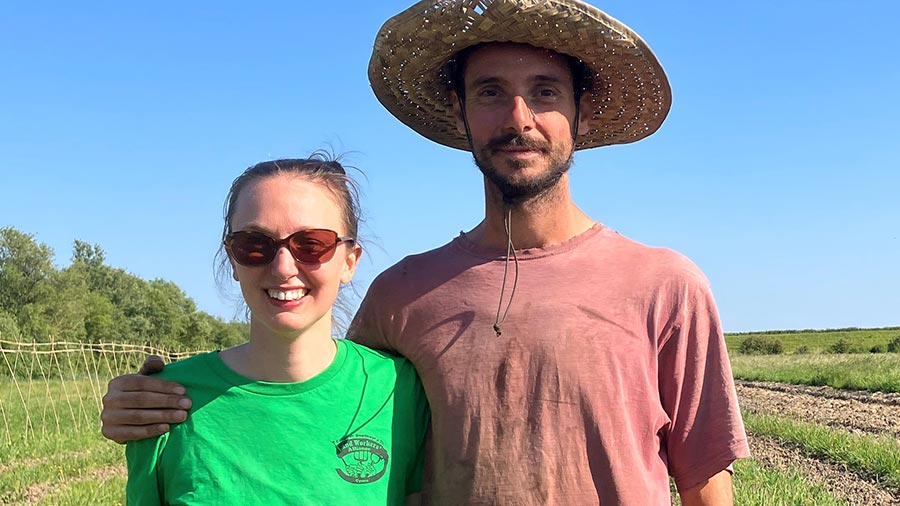
Holy Tomlinson and Jono Hughes © MAG/Emma Gillbard
The majority of the crops are sold to local farmers markets, but the couple have also been involved with a Welsh government pilot project supplying 1t of courgettes to local primary schools.
The pilot plans to get Welsh veg on to children’s plates, across 100 primary schools in South Wales. Blas Gwent is keen to continue supplying the project, with plans to scale up supply this season.
Improving soil health
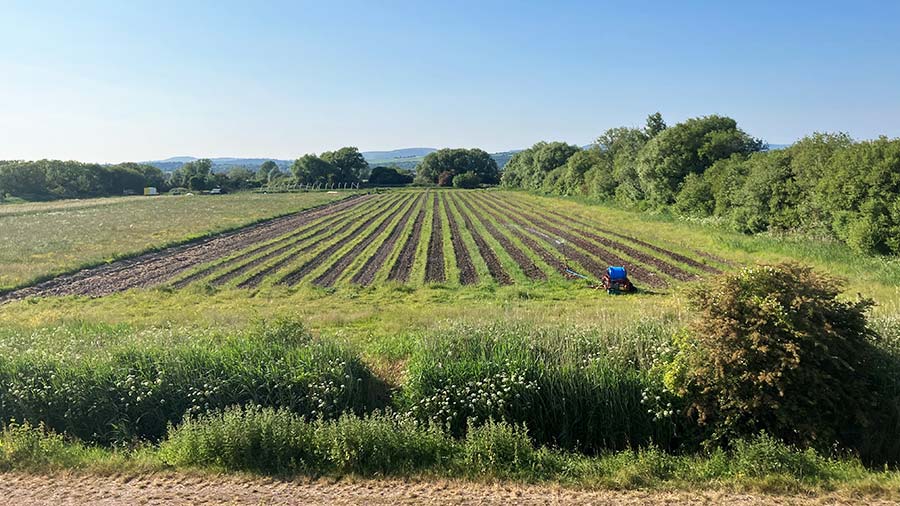
Blas Gwent fields in Cardiff © MAG/Emma Gillbard
Improving soil health is a key priority for the pair, as soil compaction is their biggest challenge. The land is reclaimed marshland, previously used for horses, so deep underlying compaction is problematic.
A cover crop mix of black oats, winter rye, triticale, grasses and red clover to build fertility is helping alleviate the issue, which forms part of a 12-year rotation to minimise build up of pests, weeds and disease.
Furthermore, Jono has incorporated existing permanent pasture to form pasture wheelings across certain blocks of the field in order to minimise compaction.
He says the principle could be scaled up in conventional arable fields to eliminate compaction and promote biodiversity.
“The grass strips run through the field like tramlines and are the exact width for our Massey 135 tractor. The grass supports the weight of the tractor to minimise compaction when cultivating, planting or weeding,” he says.
“We also get a lot of foot traffic across the field, when checking crops and hand-weeding, so the pasture wheelings provide a simple pathway to easily access crops.
“Not only this, but the grass strips act as a beetle bank to provide habitat for beneficial insects. This is important for a healthy ecosystem and keeps pest numbers low,” he continues.
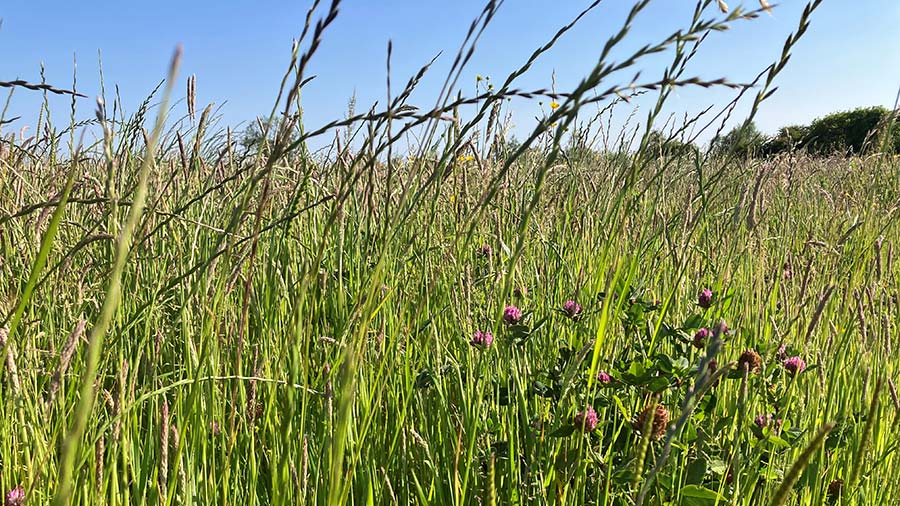
Blas Gwent cover crops © MAG/Emma Gillbard
Planting
Crops are initially grown in a polytunnel over the autumn before planting into the main field blocks during the spring.
This technique, known as a direct seed-bed bare root transplant, is used across all brassica crop types, leeks, onions, celery, lettuce and tomatoes.
Wet weather throughout March and April delayed planting this spring, but by improving soil health, Jono and Holly hope to mitigate weather extremes.
The cropping rotation moves from left to right across the field in five blocks. First, the cover crops are mown and incorporated with a spading machine.
“This is similar to a rotavator, but we find it benefits soil structure with less smearing effects. We then make a pass with the power harrow before planting with a transplanter and inter-row cultivator.”
“Focusing on micronutrients is essential to promoting natural ecosystems and liberates nutrients such as potassium nitrogen and phosphate from heavy clay soils.
“This is why we’re applying 2kg/ha of sodium molybdenite to boost plant health as the soil is currently lacking in molybdenum, ” he says.
During the growing season, crops are inter-row hoed about three times with the Massey 135, but also with a handmade, handheld power hoe.
A petrol powered irrigation pump supplies 1in of water to crops every five days.
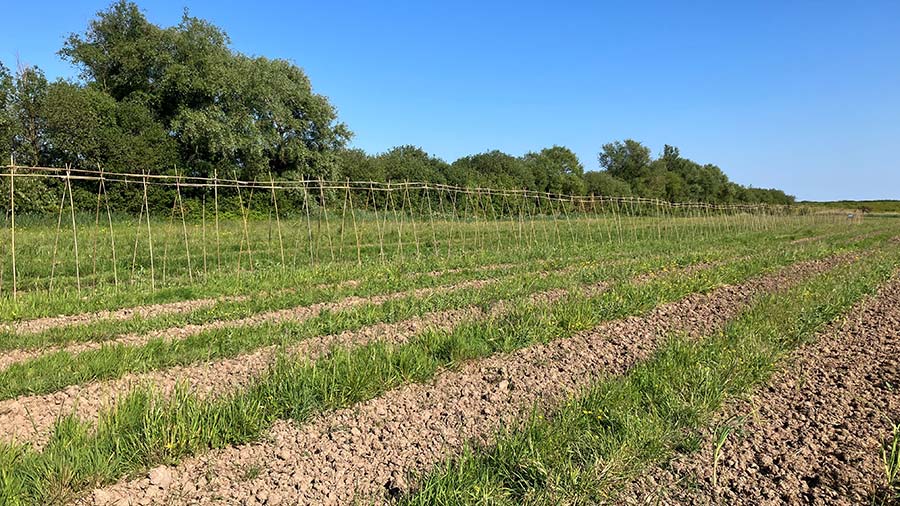
Pasture wheelings © MAG/Emma Gillbard
Next steps
Going forward, the pair hope to encourage young people into the industry and introduce them to the world of horticulture.
The pair are currently employing a young apprentice from the suburbs of Cardiff and hope to expand this reach by developing a small visitor centre for school visits and farming connect programmes.

